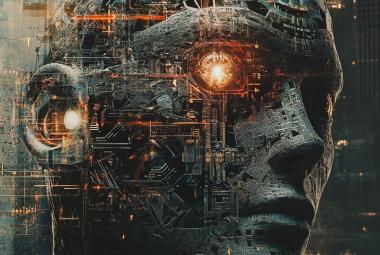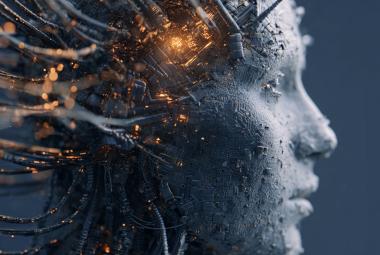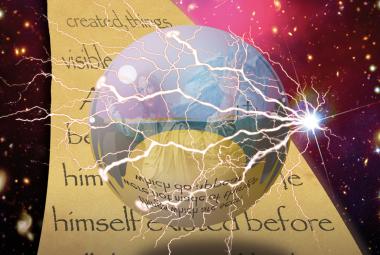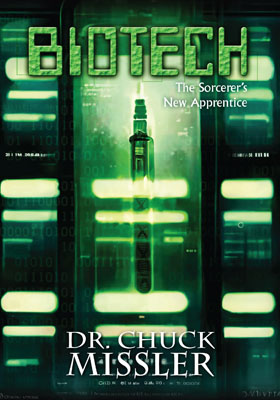The twentieth century has been marked by a rapid growth in knowledge, and the twenty-first will be stranger than we can possibly imagine. The explosive advances in science and technology have already gone far beyond what even science fiction writers once thought possible. Biotechnologists may well prove to be the "Sorcerer's Apprentices" of the 21st century[1] And these advances raise challenging issues of ethics, morals, and even our theological perspectives.
Of all the many scientific discoveries, the field which clearly has become the most controversial is the study of genetics. Genetically altered crops, cloning, in vitro fertilization, and genetic engineering all have now become a disturbing reality. What began as chance breeding of animals and plants has now become an exact science where DNA can be manipulated to produce desired, and in some cases freaky, results.
Human-Pig Hybrid
A shocking story hit the news wires last month stating that two research firms were seeking a patent for their process which produced a "human-pig" hybrid embryo. Even though the researchers denied that the embryos were a hybrid, they did admit that pig cells were infused with human DNA and allowed to grow through cell division into 32 cells over the period of a week.[2] This technique, known as "nuclear transfer," has already proven to be successful in producing clones like the sheep, Dolly.
Greenpeace was the first organization to complain about the experiment, but for different reasons than those for which pro-lifers might object. Greenpeace was concerned that researchers not be allowed to patent and claim ownership of "human" life. While loopholes in European Union and Canadian laws may permit such patents to be granted, Greenpeace representatives said, "Society should not reward these Frankenstein scientists with patents." [3]
Cross-Species Experiments
These bizarre experiments are not the first to try implanting human DNA into the egg cells of another species. Two years ago, scientists at the Massachusetts-based biotech company, Advanced Cell Technology, announced they had fused human cells into cow eggs and let them grow as an embryo for a few days.[4] The company claimed that its aim was to culture organs and tissue in the lab suitable for transplants.
The French have also tried cross-species experiments. Their product did not involve human genetics, but the implanting of jellyfish genes into a rabbit embryo. The result was a white rabbit which, under a blue light, exhibited a slight greenish glow in its eyes and fur. The rabbit's cells also glowed like a jellyfish when examined under a microscope in blue light.[5]
Amrad, an Australian company, is reported to have taken out a European patent in 1999 on its technology, which could lead to the creation of mixed-species embryos, or human-animal hybrids. The patent covers the creation of embryos containing cells from humans, mice, sheep, pigs, cattle, goats and fish. The details of the patent do not specify the use to which any hybrid embryo would be put, although Amrad's chief executive insisted that human cells would not be used.
Endangered Species Recovery?
The excitement over cloning has spread to animal groups seeking to protect endangered species. The idea of rescuing rare species or even reintroducing extinct species through cloning techniques has prompted experiments to implant cloned embryos into the womb of a surrogate animal. Until recently the surrogate needed to be of the same species in order to ensure success. However, Advanced Cell Technology has announced that the fetus of a rare Indian ox species, the guar bull, is successfully developing inside its surrogate cow mother.[6] A "Jurassic Park" may not be as remote as many of us have assumed.[7]
Got Milk?
The once-rare cloning process has gone mainstream as dairy producers met to auction off the world's first commercially cloned dairy cow. The clone, which isn't scheduled to be born until September 2001, was sold for a record $82,000. The cow to be cloned is a prize-winning cow named Mandy, which produces about twice the amount of milk annually as ordinary cows. Mandy is regularly mated with prize bulls, and the embryos are removed and implanted into surrogate cows during gestation in order to increase the number of calves from this highly valued mother. These calves typically sell for $15,000 to $25,000 each.[8]
Human Embryo Experiments
Experiments with cloned animals are controversial enough, but using similar techniques to engineer human embryos present even greater debates. Earlier this month the story of Molly Nash, a young girl suffering from a life-threatening bone marrow deficiency known as Fanconi anaemia, hit the news. In order to produce a perfect match for a bone marrow transplant, Molly's parents enlisted genetic scientists to select an embryo for in vitro fertilization, which would produce a healthy infant donor. During the procedure geneticists rejected 14 embryos and Mrs. Nash underwent four IVF cycles before becoming pregnant and eventually giving birth to her son, Adam.
While the necessary stem cells needed for Molly's bone marrow transplant were harvested from the baby's umbilical cord, the procedures raise concern for pro-life advocates, who view the discarded embryos as murdered babies.[9]
Also, a British company has developed a new test to screen test-tube embryos for low intelligence before implantation. The kit costs a little less than $200 and is being marketed by Cytocell. The test analyzes telomeres, the ends of DNA strands in each chromosome, and scientists claim that it could identify 2,000 of the 21,000 British children born each year with learning difficulties. Doctors in the U.S. and Spain have already used the technique to screen out retarded embryos. Medical ethics professionals are concerned that this is a step in the direction of eugenics.
Homosexual Reproduction?
To further complicate the moral and legal issues, Dr. Calum MacKellar, a professor of bioethics at the University of Edinburgh, believes that cloning procedures could yield technology that would allow male homosexual couples to produce a child from their own DNA, using a woman only to carry and give birth to the offspring.[10]
Implications
It is certainly a "brave new world" in which science will obviously continue to outrun the lawmakers. While politicians debate the ethical and moral issues, science is marching out to the edges of biotechnology. Laws will not likely be introduced on a global scale in time to arrest the grossest misuse of genetic advances. The last time man pursued knowledge to such an extent, God intervened and scattered the people and confounded their languages. As the Bible says in Genesis 11:6, "...now nothing will be restrained from them, which they have imagined to do." How long will it be before His patience is once again exhausted?
Some of the more bizarre terrors in the Book of Revelation seem less strange as we peer into the emerging world of biotechnology. The demon locusts of Revelation 9 are but one example. [11] The "iron mixed with miry clay" in the image of the final world empire portrayed in Nebuchadnezzar's dream of Daniel 2 has also puzzled scholars for centuries.
And whereas thou sawest iron mixed with miry clay, they shall mingle themselves with the seed of men: but they shall not cleave one to another, even as iron is not mixed with clay.
Daniel 2:43
To "mingle themselves with seed of men," they have to be something other than the seed of men. What can they be? Are they hybrids produced by cloning? Are they Nephilim produced by fallen angels? [12] Whatever they are, they apparently are prolific enough to be included within the idioms of a vision dealing with global political power in the last days! (The Restrainer of 2 Thessalonians 2 may be restraining far more than we have any idea.)
It is time to diligently do our homework; the days are getting stranger with every bizarre breakthrough and our time is getting shorter. There is no priority in our life more urgent than our spiritual preparation. None of these things is unanticipated in God's plan for you and me. And there is no way to be ready for what's coming unless you know your Bible...and unless you have a personal relationship with its Author!
Notes:
- After the famed musical composition of Paul Dukas, L'Apprenti Sorcier (1897), based on Goethe's Zauberlherling, in which unleashed forces prove uncontrollable.
- "Greenpeace Wants Canada to Say 'No' to Patents on Life," CBC News, October 5, 2000.
- John, Mark. "Greenpeace Says Firms Have Produced 'Human-Pig' Hybrid," Reuters, October 5, 2000.
- Ibid.
- "French Scientists Hopping Mad Over GM Rabbit," Reuters, October 6, 2000.
- "Cloning Process May Save Rare, Even Extinct, Species," UPI, October 8, 2000.
- Michael Crichton's fictional novel, Jurassic Park, involved the cloning of dinosaurs from its DNA obtained from a prehistoric mosquito naturally encapsulated in amber.
- Maller, Peter, "Cloning, Cloning, Gone! Calf Sells for $82,000," Journal Sentinel, www.jsonline.com, October 6, 2000.
- "Baby Created to Save Older Sister,"BBC News, October 4, 2000
- Henderson, Mark, "Male Couples Could Have Own Babies," The Times, www.sunday-times.co.uk, September 25, 2000.
- "Gog" is the king of the locusts in Amos 7:1(LXX).
- For a discussion of the strange events of Genesis 6, see our briefing package, The Return of the Nephilim, or the book, Alien Encounters, by Drs. Mark Eastman and Chuck Missler, from this publisher.








